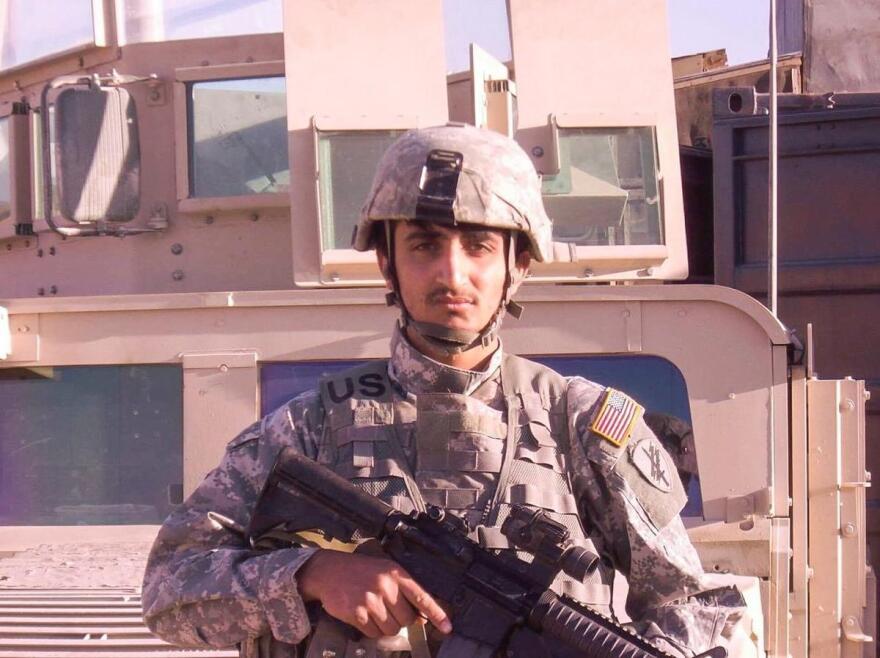In a war zone, the right translation can mean the difference between life and death.
This makes the role of translators and interpreters, like Zalmay “Zee” Niazy, a pivotal one. Niazy aided U.S. military members and allies in Afghanistan as a part of Operation Enduring Freedom. In 2015 he moved to Iowa Falls in order to escape threats from the Taliban, which was targeting him for his involvement with the United States.
Which makes the country’s decision to deny Niazy asylum all the more puzzling.
Niazy, Song and Ingebritson made their remarks on River to River.

Zalmay “Zee” Niazy
Niazy became an interpreter for the military when he was 19-years-old, and he told River to River’s Ben Kieffer that that was his first time in a warzone.
“At first it was very shocking, but I got used to it, and I said if I want to serve my country and the United States, and appreciate their effort in my country, I have to stay and I have to do this,” he says.
Captain Robert Song served with Niazy during his 2007 tour. Song says that the interpreters he worked with were on the ground, facing the same dangers as U.S. troops.
“They were exposed to the same level of danger that we were…but didn't necessarily have access to all the same sort of equipment that we had,” says Song. “We were issued pretty significant body armor, helmets, weapons. And, for the most part, the interpreters were sort of left to fend for themselves. They didn't have access to this equipment.”
In some ways, even though they were there with us, they the level of danger they were exposed to was, was was even greater.Captain Robert Song
Song says translators continually risked their lives to help the United States and its allies. He recalls a time when he, Niazy and others were on their way to an outpost, and their vehicle was attacked by a rocket-propelled grenade. No one was hurt, and when they were out of imminent danger, Song remembers looking in the backseat and seeing Niazy calm and composed, ready to work. “That's sort of how I remember him over the course that year. Somebody who is very stoic, just sort of does what he needs to do. And really was there for us that never, never hesitated or waivered to sort of come with us, no matter what the danger was.”
That danger was, and continues to be, immense for Niazy and others in his position. Mike Ingebritson, who Niazy affectionately calls his adopted grandfather, says he has heard anecdotes from servicemen about these dangers.
“I had a very close relative that was a foot soldier,” says Ingebritson. “And he told me once that they got a call to pick up their interpreter in the center of town, where they thought something was wrong. So when they went to get him, he was there in a box, and he had been dismembered.”
A target
The nonprofit No One Left Behind reports that more than 300 military interpreters from Iraq and Afghanistan and their family members have been killed because of their involvement with the United States. Niazy describes Afghan people who have helped the United States as ‘targets’ for the Taliban. “If I might get a denial from the court, that will be a death sentence for me to go back home.”
Despite this, Niazy says that when his asylum application was denied, one reason cited was that he did not face a real threat of persecution in Afghanistan. This was surprising on its own, but not as shocking to him as the other reason cited in the decision – that Niazy had participated in terrorist activities.
During the interview, which Niazy says took six or seven hours, he was asked about his closest interaction with the Taliban.
“I was nine years old, and we were playing by our house. One day, there were a bunch of them, they came to the village, and they said, you're bringing me a piece of bread from the house. Otherwise, I will burn your house, and I will kill your parents. And I was so scared, went home and told my mom, and mom throw me a piece of bread, which is just, not even four inches, and throw that to me. And she said, and just go give it to them.”
According to Niazy, the interviewer said that this incident from when he was a child qualified as material support for a terrorist organization.
Red tape
"They told me that they will get my results in two weeks. And that two weeks turned into four years and two months. This last month, on May 17, I received a letter that is said that my application has been denied by the asylum officer."Zalmay Niazi
The United States has a system in place specifically for people like Niazy and the thousands of Afghanistan locals who have worked with U.S. forces in the last 20 years. The Special Immigrant Visa (SIV) was designed “to enable certain Iraqi and Afghan nationals to become U.S. lawful permanent residents.” But the application process is convoluted, and is rife with red tape and paperwork. Currently the backlog has more than 18,000 applicants, not including family members, who are also in danger by association. President Joe Biden has said the United States will withdraw U.S. troops from Afghanistan by September 11, 2021, and that number is expected to go up as a result.
On June 4 of this year, a bipartisan group of lawmakers sent a letter to Biden, saying plainly that the SIV system is broken. “It takes an average of 800+ days, and we plan to withdraw in less than 100 days,” the letter states. “While our working group is investigating various process efficiencies and options for expanding the number of SIVs available, it is clear that the process will not be rectified in time to help the 18,000+ applicants who need visas before our withdrawal.”
“This is a single case here, there's probably hundreds, and maybe more cases, just like this,” says Song. “And I really think we need we need some actions, some legislative action, or some leadership at a government level, to address these kinds of injustices, you know, starting with Zee's case, but you know, applying much more broadly across all of the interpreters like Zee.”
Ingebritson notes that support for translators and interpreters is important not just for them, but also for the soldiers with whom they work.
“We will be in conflicts again, somewhere, some place, and our soldiers will ask the locals to interpret for them. And if the locals say, ‘Well, how are you going to take care of me? Are you going to do that? Are you going to protect me?’ And we’ll say at that time, 'Yeah, sometimes we will,'” Ingebritson says. “When it gets down to the bottom line, the politicians won't have to pay the price, the price is going to be paid by the American soldier.”
Fighting
Niazy will head to immigration court in July to appeal the denial of his asylum application. He says he is looking for an immigration lawyer at the moment. A GoFundMe to pay legal fees and other expenses has been started for Niazy, one of many dedicated to interpreters in similar positions.
Niazy says he wants to earn his master’s degree to be an accountant in the United States, if he is able to stay.
While Niazy is, of course, scared, he says a bright spot amid all the turmoil has been seeing the support from Iowans.
“I've been overwhelmed with support and love of the community and great state of Iowa, and especially Iowa Falls. And everybody is very helpful. They encouraged me to fight this, and they are all with me with this… it's not only my problem now. It's our problems [SIC], the whole town.”
You can hear Niazy’s full interview on River to River, hosted by Ben Kieffer and produced by Zachary Oren Smith.





